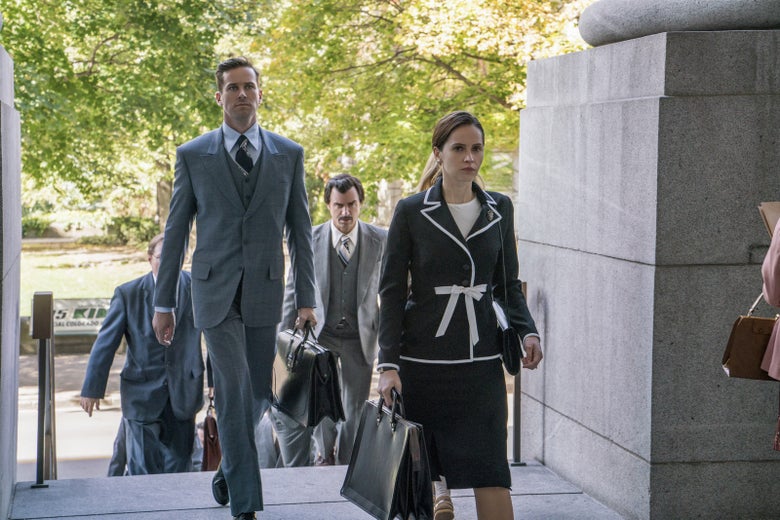How Many Times Is The Word Freedom In The Constitution
Is There a Glaring Legal Error in the Trailer for the New Ruth Bader Ginsburg Biopic?

On Mon, Focus Features released the official trailer for On the Footing of Sex, a biopic dramatizing Supreme Court Justice Ruth Bader Ginsburg'southward piece of work as a civil rights litigator. Before she was a approximate and progressive icon, Ginsburg worked with the American Ceremonious Liberties Union to sue the regime for sex discrimination, ultimately persuading the Supreme Court to expand ramble protections for women. The new movie, which is scheduled for release on Christmas 24-hour interval, stars Felicity Jones (doing her best stab at RBG's Brooklyn accent) and Armie Hammer as her tardily husband, Marty Ginsburg—a stroke of casting genius, as immature Marty was, similar Hammer, a total dreamboat.
Based on the trailer, On the Footing of Sex appears to present Ginsburg'south undeniably inspirational story at a level that non-legal audiences will understand and enjoy. Legal commentators, though, take picked upwardly on a glaring problem, one that pops up in the trailer'southward final snippet of dialogue. The scene takes identify in a court, with Ginsburg standing before the bench. A glowering male judge tells her: "The word 'woman' does not appear fifty-fifty once in the U.Due south. Constitution." She responds assertively: "Nor does the word 'freedom,' your honor." Mic drop. Cut to championship bill of fare.
The rather obvious problem hither—equally Cristian Farias, Ian Millhiser, Ian Samuel, and others have pointed out—is that the discussion "liberty" does appear in the Constitution. It's correct there in the First Amendment, which declares that "Congress shall make no law … abridging the liberty of spoken language." The amendments are, without question, part of the Constitution itself. At best, the line appeared to be a glaring fault that would alienate every lawyer in the audience. At worst, information technology seemed like an embarrassing harbinger of a broadly fact-challenged motion picture.
But according to screenwriter Daniel Stiepleman, the motion picture'southward screenwriter, the "freedom" line isn't a mistake at all. Stiepleman, who happens to be Ginsburg'due south nephew, told me that RBG's mic drop makes sense in the context of the total scene. "I want to be conscientious non to 'spoil' the scene by over-explaining it," he said, "simply in the 'thrust and parry' of oral arguments, Ruth is citing the text of the Constitution, every bit ratified without the Bill of Rights. That the discussion 'freedom' is in the Starting time Amendment isn't a flaw of the line, it'south the point she's building to." Stiepleman connected:
The scene is about something I came to capeesh while writing On the Basis of Sex—how America is always trying to "form a more perfect union." The amendments to the Constitution are bear witness of that. The Showtime Amendment introduced the word "freedom" to the Constitution. The 14th added the word "equal." etc.
And by the style, I'1000 delighted that even before the film has come out, it has people discussing the finer points of constitutional law. I hope the reactions to the moving-picture show are as thought-provoking every bit the reactions to the trailer.
I was initially skeptical that the "freedom" line could come off equally anything but a blunder in whatever context. Stiepleman'southward caption, withal, is quite plausible. The Constitution's ability to protect new classes and rights is indeed a central piece of Ginsburg's jurisprudence. In her celebrated decision requiring the inclusion of women at the Virginia War machine Institute, Ginsburg wrote that "a prime number part of the history of our Constitution … is the story of the extension of ramble rights and protections to people in one case ignored or excluded." Since its founding, she explained, the United states of america has continually evolved to toward a more inclusive understanding of "Nosotros the People."
Presumably, so, the full courtroom scene in On the Basis of Sexual practice will involve a colloquy about the evolution of constitutional rights, during which Ginsburg notes that the Constitution every bit ratified was missing some critical safeguards—including the broad "liberty" guaranteed by the First Amendment. And much as the country soon enshrined that freedom by ratifying the Bill of Rights, judges now must extend true liberty to women by ending authorities-sponsored sex discrimination.
That makes sense to me—and, apparently, to Ginsburg, as well. Mimi Leder, the film's managing director, has said that Ginsburg "loves the film" and "approved the script." There is no way that Ginsburg would've immune her dramatized self to forget about the Starting time Amendment. A super diva like RBG does not take such mistakes lightly.
Source: https://slate.com/culture/2018/07/the-trailer-for-the-new-ruth-bader-ginsburg-biopic-says-freedom-isnt-in-the-constitution.html
Posted by: rosstionfur.blogspot.com

0 Response to "How Many Times Is The Word Freedom In The Constitution"
Post a Comment